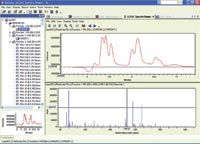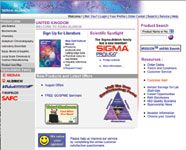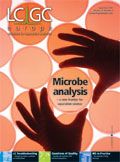News
Emerald expansion
Emerald expansion
Fisher Scientific has announced an agreement with Reagecon/Alkem of Shannon, County Clare to distribute its laboratory products in the Republic of Ireland.

Reagecon is a chemical measurement and laboratory equipment specialist and will be Fisher Scientific's sole representative for all product lines, from laboratory chemicals and apparatus to safety and specialist life-science research products.
Commenting on the arrangement, David Westwater, Managing Director of Fisher Scientific UK said, "We are delighted by this new business association. Reagecon is a perfect fit and this will enable us to provide the best service to our Irish customers."
Thermo named readers' choice
Thermo Electron Corporation has announced that its GRAMS™ desktop spectroscopy software is named the 2005 Readers' Choice Award winner for spectroscopy software in an annual survey conducted by Scientific Computing and Instrumentation, and that Thermo's SampleManager™ laboratory information management system and Atlas™ chromatography data system were finalists in the LIMS and CDS categories. Thermo is the only company with its products nominated in these three categories for 2005.

The winning nomination was for Thermo's GRAMS Suite — a desktop spectroscopy data processing and reporting software solution for visualizing, processing and managing spectroscopy data. GRAMS offers broad compatibility with many different instrument data types and a simple user interface. Life and analytical science researchers rely on GRAMS' powerful collection of processing routines to solve some of their most difficult data analysis problems. The GRAMS suite improves access to data while reducing the need for multiple software packages and associated training.
Sigma restructure
Sigma-Aldrich has recently announced a new organization consisting of four customer-centric business units, each headed by a president reporting to the Company's President and COO. The restructuring is intended to further enhance the company's ability to serve its diverse base of more than sixty thousand commercial accounts comprising one million individual customers worldwide and the potential for above market growth rates.

After an extensive six month study that included interviews with nearly 650 customers around the globe, the company is reorganizing its two existing life science and high technology research businesses — scientific research and biotechnology — into three units, each with its own distinctive competencies to meet the needs of carefully defined customer segments.
The company's final business, SAFC, which stands separate from these research units and represents 25% of the company's current sales after the recent acquisition of JRH Biosciences, offers fine chemical products and flexible service solutions for customers in the three key industrial market segments of pharma, biosciences and hi-tech. SAFC will continue to be led by Frank Wicks, 52, who has served as the unit's President since January 2003.
While these organizational changes are effective immediately, the company plans to continue to report its sales results for its three existing scientific research, biotechnology and SAFC business units through 2005 and begin reporting under the new four-unit structure in 2006.

Understanding FDA Recommendations for N-Nitrosamine Impurity Levels
April 17th 2025We spoke with Josh Hoerner, general manager of Purisys, which specializes in a small volume custom synthesis and specialized controlled substance manufacturing, to gain his perspective on FDA’s recommendations for acceptable intake limits for N-nitrosamine impurities.
University of Rouen-Normandy Scientists Explore Eco-Friendly Sampling Approach for GC-HRMS
April 17th 2025Root exudates—substances secreted by living plant roots—are challenging to sample, as they are typically extracted using artificial devices and can vary widely in both quantity and composition across plant species.
Determining the Serum Proteomic Profile in Migraine Patients with LC–MS
April 17th 2025Researchers used liquid chromatography–mass spectrometry (LC–MS) in their proteomic analysis to compare the serum proteome of migraine patients with healthy controls and to identify differentially expressed proteins as potential migraine biomarkers.










